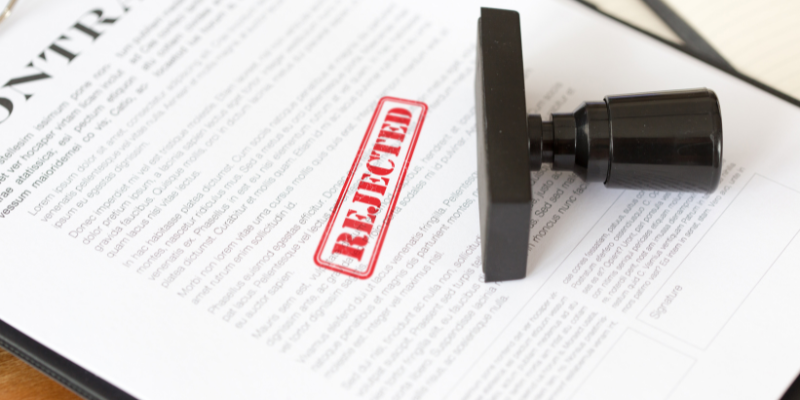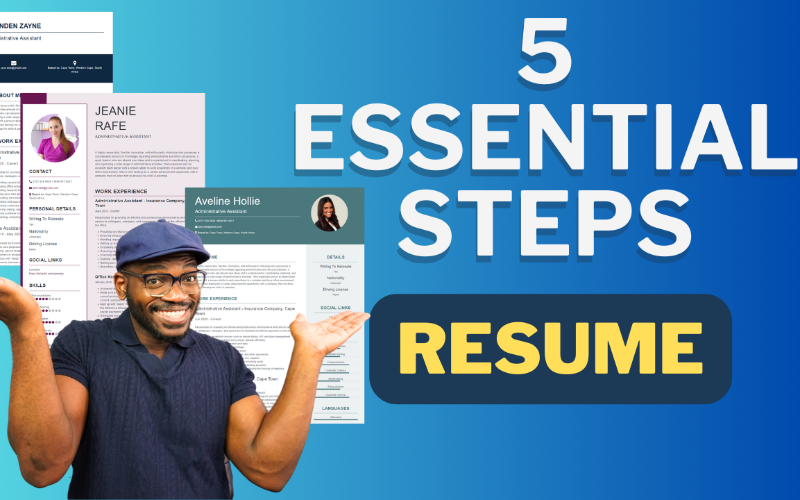Table of Contents
Introduction
The job search process can be a time of heightened anxiety and stress. It's a period filled with uncertainty, heightened expectations, and often, a sense of urgency. This anxiety, if not managed well, can become a barrier to effectively finding new employment opportunities. Understanding job search anxiety and adopting effective strategies to manage it is crucial for maintaining mental well-being during this challenging phase. This blog post explores various approaches to overcoming job search anxiety, helping you navigate your job hunting journey with confidence and resilience.

Recognizing the Signs of Job Search Anxiety
Identifying Symptoms of Job Search Anxiety
Job search anxiety can manifest in various ways, affecting your emotional, physical, and behavioral well-being. Emotionally, it might present as persistent worry, feelings of inadequacy, or fear of rejection. Physically, symptoms can include sleep disturbances, changes in appetite, or increased fatigue. Behaviorally, you might notice procrastination, avoidance of job search tasks, or excessive fixation on the outcomes of applications.
Common Emotional and Physical Symptoms:
-
Constant worry about job prospects.
-
Sleep disturbances and changes in eating habits.
-
Avoidance behaviors and decreased motivation.
The Impact of Prolonged Anxiety on Job Search
Chronic anxiety not only affects your health but can also diminish the effectiveness of your job search. It can lead to a lack of focus, poor decision-making, and can even come across in interviews, potentially affecting your chances of securing a job.
Consequences of Ongoing Anxiety:
-
Reduced ability to concentrate and make sound decisions.
-
Negative impact on interview performance.
-
Potential to prolong the job search process.
Developing a Positive Mindset
Shifting Your Perspective
Adopting a positive mindset is crucial in combating job search anxiety. It involves reframing your thoughts and focusing on what you can control. Instead of dwelling on the uncertainties or potential negatives, concentrate on your strengths and the opportunities that lie ahead. Acknowledge your efforts and celebrate small victories, like securing an interview or getting positive feedback.
Tips for Cultivating Positivity:
-
Practice positive affirmations and self-encouragement.
-
Focus on your achievements and skill set, rather than fixating on job rejections.
-
View each job application as a learning opportunity and a step closer to your goal.
Setting Realistic Goals and Expectations
Setting achievable goals and having realistic expectations can significantly reduce job search anxiety. Break down your job search into manageable tasks and set clear, attainable objectives. This approach can prevent feelings of being overwhelmed and help maintain a sense of progress and control.
Goal-Setting Strategies:
-
Set daily or weekly goals, such as submitting a certain number of applications.
-
Be realistic about the time frame for finding a new job.
-
Celebrate achieving these smaller goals to maintain motivation.

Effective Stress Management Techniques
Relaxation and Mindfulness Practices
Incorporating relaxation and mindfulness techniques into your routine can greatly alleviate stress and anxiety. Practices like deep breathing, yoga, or meditation can help calm your mind and improve your mental clarity, enhancing your overall job search process.
Relaxation Techniques:
-
Deep breathing exercises to manage moments of acute stress.
-
Regular practice of meditation or mindfulness to cultivate a sense of calm.
-
Engaging in yoga or other forms of gentle physical activity to relieve tension.
Physical Wellness and Its Role in Reducing Anxiety
Physical well-being plays a significant role in managing stress and anxiety. Regular exercise, a balanced diet, and adequate sleep can boost your mood, increase your energy levels, and improve your mental sharpness, all of which are beneficial during a job search.
Physical Wellness Tips:
-
Maintain a regular exercise routine to reduce stress hormones.
-
Eat a balanced diet to fuel your body and mind.
-
Ensure you get enough sleep to rest and rejuvenate.
Organizing Your Job Search
Structuring Your Job Hunting Process
An organized approach to job searching can make the process less daunting and more manageable. Create a job search plan that outlines your daily and weekly activities. This can include researching companies, networking, applying to jobs, and preparing for interviews.
Organization Tips:
-
Keep a job search journal or use digital tools to track your applications and follow-ups.
-
Allocate specific time blocks for different job search activities.
-
Stay organized with a calendar or planner to manage your job search schedule.
Time Management Strategies
Effective time management is key in maintaining a balanced approach to job searching. Avoid spending all day on job search activities. Instead, set aside dedicated time for these tasks and balance them with other activities or rest.
Time Management Techniques:
-
Use techniques like the Pomodoro Technique to break work into intervals with short breaks.
-
Set clear boundaries to separate job search time from personal time.
-
Avoid multitasking to maintain focus and productivity.
Leveraging Support Networks
The Importance of Social Support
Having a strong support network is invaluable during a job search. Family, friends, and professional contacts can offer not only emotional support but also practical advice and networking opportunities. Don't hesitate to share your experiences and challenges with trusted individuals; sometimes, just talking about your job search can alleviate stress.
Building and Using Your Support Network:
-
Regularly communicate with family and friends about your job search journey.
-
Attend networking events and connect with industry professionals.
-
Consider joining job search groups or online forums for additional support and resources.
Seeking Professional Help When Needed
If job search anxiety becomes overwhelming, it may be beneficial to seek professional guidance. Career counselors can provide practical job search advice, while mental health professionals can offer strategies to cope with anxiety and stress.
Professional Support Options:
-
Career counseling for tailored job search strategies.
-
Therapy or counseling for coping with stress and anxiety.
-
Workshops and seminars focusing on career development and mental well-being.

Building Resilience in the Face of Rejection
Coping Mechanisms for Dealing with Job Rejection
Rejection is an inevitable part of the job search process but dealing with it constructively is crucial for maintaining mental health. Instead of viewing rejection as a personal failure, try to see it as a normal step in the journey toward the right opportunity.
Strategies to Handle Rejection:
-
Remind yourself that rejection is not a reflection of your worth.
-
Seek feedback where possible to improve for future opportunities.
-
Engage in self-care activities to boost your mood and confidence.
Learning from Rejection
Every rejection can be a learning experience. Reflect on your applications and interviews to identify areas for improvement. This reflection can transform a negative experience into a valuable lesson for future success.
Learning from Job Rejection:
-
Analyze your interview performance and application materials for improvement areas.
-
Consider seeking feedback from hiring managers or interviewers.
-
Use rejection as a motivator to refine your job search strategy.
Utilizing Resources and Tools
Digital Tools to Ease the Job Search
There are various digital tools and apps designed to streamline the job search process. These tools can help organize your applications, prepare for interviews, and even connect you with potential employers.
Helpful Digital Tools:
-
Job search platforms like LinkedIn, Indeed, and Glassdoor.
-
Interview preparation apps offering practice questions and tips.
-
Organizational tools to track applications and follow-up tasks.
Educational Resources for Skill Development
Continuous learning and skill development can not only improve your job prospects but also boost your confidence. Utilize online courses, webinars, and workshops to enhance your skill set and make you a more attractive candidate.
Skill Development Resources:
-
Online platforms like Coursera, Udemy, and LinkedIn Learning.
-
Webinars and virtual workshops offered by industry experts.
-
Local community colleges or adult education centers for in-person learning opportunities.

Maintaining Work-Life Balance
The Role of Hobbies and Interests
Engaging in hobbies and interests outside of your job search is essential for maintaining a healthy work-life balance. These activities can provide a much-needed break from the stresses of job hunting, allowing you to relax and recharge. Whether it's a sport, a creative pursuit, or simply spending time with loved ones, make sure to allocate time for activities that bring you joy and relaxation.
Benefits of Hobbies and Interests:
-
They provide a sense of accomplishment and enjoyment.
-
Help in reducing stress and increasing overall happiness.
-
Improve mental health by offering a change of pace and focus.
Creating a Daily Routine
Establishing a routine can bring structure to your day and prevent job search activities from overwhelming your life. Include set times for job search tasks, exercise, hobbies, and relaxation. A well-structured routine can enhance productivity and reduce anxiety by creating a balanced approach to daily activities.
Elements of a Balanced Daily Routine:
-
Designate specific hours for job searching and stick to them.
-
Include regular breaks and leisure time to avoid burnout.
-
Ensure you have a consistent sleep schedule to maintain energy levels.
Conclusion
Navigating job search anxiety is a crucial aspect of maintaining mental well-being during your career transition. By implementing these strategies, you can manage stress, stay motivated, and maintain a positive outlook throughout your job hunting journey. Remember, taking care of your mental health is as important as finding the right job. With resilience, support, and a balanced approach, you can overcome the challenges of job searching and emerge stronger and more prepared for your next career opportunity.
FAQs
Frequently Asked Questions About Managing Job Search Anxiety
-
How can I stay motivated during a prolonged job search?
-
Set small, achievable goals and celebrate reaching them to maintain motivation.
-
Connect with others in similar situations for mutual support and encouragement.
-
-
What should I do if I feel overwhelmed by job search anxiety?
-
Take a step back and engage in activities that help you relax and recharge.
-
Consider speaking with a professional for support and guidance.
-
-
Can mindfulness really help reduce job search stress?
-
Yes, mindfulness practices can help calm your mind and reduce stress by focusing your attention on the present moment.
-
-
How important is physical exercise during the job search?
-
Very important. Regular exercise releases endorphins, which can improve mood and reduce feelings of anxiety.
-
-
Is it okay to take breaks from job searching?
-
Absolutely. Taking short breaks can prevent burnout and help you return to your job search with renewed energy and perspective.
-







